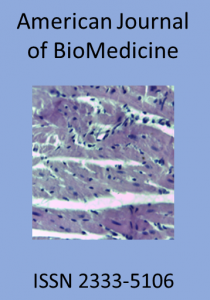Review Article
American Journal of BioMedicine
Volume 12, Issue 2, 2024, Pages 33-42 ![]() 10.18081/2333-5106/2024.12/33
10.18081/2333-5106/2024.12/33
Sreejith Prinja1 ![]() , Yashika Vanak
, Yashika Vanak ![]() ,Pierre Rajsekar
,Pierre Rajsekar![]() , Christl Singh
, Christl Singh ![]() *
*![]()
Received 2 November 2023; revised 3 March 20234; accepted 30 March 2024; published 6 April 2024
Abstract
The chemotherapy and immunosuppressive medication may be associated with the suppressed immune system of a cancer patient making them susceptible to Coronavirus disease 2019 (COVID-19) with unclear mechanisms. We reviewed current studies on the clinical courses of leukemia patients with a risk of SARS-CoV-2 infection through searches in Pubmed databases and Google search engines. The criterion used for review includes their relevance to the defined review question, which is the outcome of COVID‐19 among leukemic patients and the relevant therapeutic interventions therewith. Patients with acute leukemia are among the most vulnerable groups of patients at risk of severe COVID-19 outcomes with several protocol management modifications proposed. The development of COVID-19 vaccines was an important milestone in reducing the risk of contracting and developing severe COVID-19 symptoms in leukemic patients after remission status. The European Society for Blood and Marrow Transplantation (EBMT), a collaborative network of centers and individuals working in the field of BMT and cellular therapy, has been updating its recommendations since the start of the COVID-19 pandemic.
Keywords: Leukemia; COVID-19; Chemotherapy; Immunosuppression
Copyright © 2024 Christl Singh, et al. This article distributed under the Creative Commons Attribution License, which permits unrestricted use, distribution, and reproduction in any medium, provided the original work is properly cited.
Cited by CrossRef (1)
Cited by Scopus (0)
| 1. Liang X, Yang C. Full spectrum of cancer patients in SARS‐CoV‐2 infection still being described. Clin Oncol. 2020;32(6):407. https://doi.org/10.1016/j.clon.2020.03.016 |
|||
| 2. Johnston EE, Martinez I, Davis ES, Caudill C, Richman J, Brackett J, et al. SARS-CoV-2 in childhood cancer in 2020: a disease of disparities. J Clin Oncol. 2021;39(34):3778-3788. https://doi.org/10.1200/JCO.21.00702 |
|||
| 3. Ferrari A, Zecca M, Rizzari C, Porta F, Provenzi M, Marinoni M, et al. Children with cancer in the time of COVID-19: an 8-week report from the six pediatric onco-hematology centers in Lombardia, Italy. Pediatr Blood Cancer. 2020;67(8):e28410. https://doi.org/10.1002/pbc.28410 |
|||
| 4. Wang H, Li Z. Risk of COVID‐19 for patients with cancer. Lancet Oncol. 2020;21:e181. https://doi.org/10.1016/S1470-2045(20)30149-2 |
|||
| 5. Thompson MA, Henderson JP, Shah PK, Rubinstein SM, Joyner MJ, Choueiri TK, et al. Association of convalescent plasma therapy with survival in patients with hematologic cancers and COVID-19. JAMA Oncol. 2021. https://doi.org/10.1101/2021.02.05.21250953 |
|||
| 6. Houot R, Levy R, Cartron G, Armand P. Could anti-CD20 therapy jeopardise the efficacy of a SARS-CoV-2 vaccine? Eur J Cancer. 2020;136:4-6. https://doi.org/10.1016/j.ejca.2020.06.017 |
|||
| 7. Greenberger LM, Saltzman LA, Senefeld JW, Johnson PW, DeGennaro LJ, Nichols GL. Antibody response to SARS-CoV-2 vaccines in patients with hematologic malignancies. Cancer Cell. 2021;39(8):1031-1033. https://doi.org/10.1016/j.ccell.2021.07.012 |
|||
| 8. Printz C. Experts discuss cancer care and research in the age of COVID‐19. Cancer. 2020;126(20):4443‐4444. https://doi.org/10.1002/cncr.33228 |
|||
| 9. van der Veldt AAM, Oosting SF, Dingemans AC, Fehrmann RSN, GeurtsvanKessel C, Jalving M, et al. COVID-19 vaccination: the VOICE for patients with cancer. Nat Med. 2021;27(4):568-569. https://doi.org/10.1038/s41591-021-01240-w |
|||
| 10. Lai AG, Pasea L, Banerjee A, Hall G, Denaxas S, Chang WH, et al. Estimated impact of the COVID-19 pandemic on cancer services and excess 1-year mortality in people with cancer and multimorbidity: near real-time data on cancer care, cancer deaths and a population-based cohort study. BMJ Open. 2020;10(11):e043828. https://doi.org/10.1136/bmjopen-2020-043828 |
|||
| 11. Jose RJ, Manueal A. COVID‐19 cytokine storm: the interplay between inflammation and coagulation. Lancet Respir Med. 2020;8:e46‐e47. https://doi.org/10.1016/S2213-2600(20)30216-2 |
|||
| 12. London JW, Fazio-Eynullayeva E, Palchuk MB, Sankey P, McNair C. Effects of the COVID-19 pandemic on cancer-related patient encounters. JCO Clin Cancer Inform. 2020;4:657-665. https://doi.org/10.1200/CCI.20.00068 |
|||
| 13. Rubinstein S, Lynch RC, Desai A, Stratton C, Jha A, Bakouny Z, et al. Severity of Sars-Cov-2 infection in patients with hematologic malignancies: a COVID-19 and Cancer Consortium (CCC19) registry analysis. Blood. 2020;136(Supplement 1):28-30. https://doi.org/10.1182/blood-2020-141937 |
|||
| 14. Cele S, Jackson L, Khoury DS, Khan K, Moyo-Gwete T, Tegally H, et al. Omicron extensively but incompletely escapes Pfizer BNT162b2 neutralization. Nature. 2022;602(7898):654-656. https://doi.org/10.1038/s41586-021-04387-1 |
|||
| 15. Tang LV, Hu Y. Poor clinical outcomes for patients with cancer during the COVID‐19 pandemic. Lancet Oncol. 2020;21:862‐863. https://doi.org/10.1016/S1470-2045(20)30311-9 |
|||
| 16. Mileham KF, Bruinooge SS, Aggarwal C, Patrick AL, Davis C, Mesenhowski DJ, et al. Changes over time in COVID-19 severity and mortality in patients undergoing cancer treatment in the United States: initial report from the ASCO Registry. JCO Oncol Pract. 2021:OP2100394. https://doi.org/10.1200/OP.21.00394 |
|||
| 17. Kutikov A, Weinberg DS, Edelman MJ, Horwitz EM, Uzzo RG, Fisher RI. A war on two fronts: cancer care in the time of COVID-19. Ann Intern Med. 2020;172(11):756-758. https://doi.org/10.7326/M20-1133 |
|||
| 18. Moghadasi AN. Should Patients with MS Discontinue Their Medications During the COVID-19 Pandemic?. Arch Neurosci. 2020; 7:e103409. https://doi.org/10.5812/ans.103409 |
|||
| 19. Li L, Xv Q, Yan J. COVID-19: the need for continuous medical education and training. Lancet Respir Med. 2020; 8:e23. https://doi.org/10.1016/S2213-2600(20)30125-9 |
|||
| 20. Lucchini M, Bianco A, Del Giacomo P, De Fino C, Nociti V, Mirabella M. Is serological response to SARS-CoV-2 preserved in MS patients on ocrelizumab treatment? A case report. Mult Scler Relat Disordt. 2020; 44:102323. https://doi.org/10.1016/j.msard.2020.102323 |
|||
| 21. Kim W, Kim SH, Huh SY, Kong SY, Choi YJ, Cheong HJ, et al. Reduced antibody formation after influenza vaccination in patients with neuromyelitis optica spectrum disorder treated with rituximab. Eur J Neurol. 2013; 20:975-80. https://doi.org/10.1111/ene.12132 |
|||
| 22. Quinti I, Lougaris V, Milito C, Cinetto F, Pecoraro A, Mezzaroma I, et al. A possible role for B cells in COVID-19? Lesson from patients with agammaglobulinemia. J Allergy Clin Immunol. 2020; 146:211-3 e4. https://doi.org/10.1016/j.jaci.2020.04.013 |
|||
| 23. Zou X, Chen K, Zou J, Han P, Hao J, Han Z. Single-cell RNA-seq data analysis on the receptor ACE2 expression reveals the potential risk of different human organs vulnerable to 2019-nCoV infection. Front Med. 2020; 14:185-92. https://doi.org/10.1007/s11684-020-0754-0 |
|||
| 24. Shahidi-Dadras M, Abdollahimajd F, Ohadi L, Tabary M, Araghi F, Mozafari N, et al. COVID-19 in pemphigus vulgaris patients with previous rituximab therapy: a tele-medicine experience. J Dermatolog Treat. 2020;1-2. https://doi.org/10.1080/09546634.2020.1789041 |
|||
| 25. Loarce-Martos J, Garcia-Fernandez A, Lopez-Gutierrez F, Garcia-Garcia V, Calvo-Sanz L, Del Bosque-Granero I, et al. High rates of severe disease and death due to SARS-CoV-2 infection in rheumatic disease patients treated with rituximab: a descriptive study. Rheumatol Int. 2020; 40:2015-21. https://doi.org/10.1007/s00296-020-04699-x |
|||
| 26. Safavi F, Nourbakhsh B, Azimi AR. B-cell depleting therapies may affect susceptibility to acute respiratory illness among patients with multiple sclerosis during the early COVID-19 epidemic in Iran. Mult Scler Relat Disord. 2020; 43:102195. https://doi.org/10.1016/j.msard.2020.102195 |
|||
| 27. Montero-Escribano P, Matias-Guiu J, Gomez-Iglesias P, Porta-Etessam J, Pytel V, Matias-Guiu JA. Anti-CD20 and COVID-19 in multiple sclerosis and related disorders: A case series of 60 patients from Madrid, Spain. Mult Scler Relat Disord. 2020; 42:102185. https://doi.org/10.1016/j.msard.2020.102185 |
|||
| 28. Yang J, Zheng Y, Gou X, Pu K, Chen Z, Guo Q, et al. Prevalence of comorbidities and its effects in patients infected with SARS-CoV-2: a systematic review and meta-analysis. Int J Infect Dis. 2020; 94:91-5. https://doi.org/10.1016/j.ijid.2020.03.017 |
How to cite
Prinja S, Vanak Y, Rajsekar P, Singh C. Outcome of COVID-19 in patients with a history of acute leukemia; A Narrative Review. American Journal of BioMedicine 2024; 12(2):33-42.
More citation
Article Metrics
Permissions
This work is licensed under a Creative Commons Attribution-NonCommercial 4.0 International License.
All articles published in American Journal of BioMedicine are licensed under Copyright Creative Commons Attribution-NonCommercial 4.0 International License.



